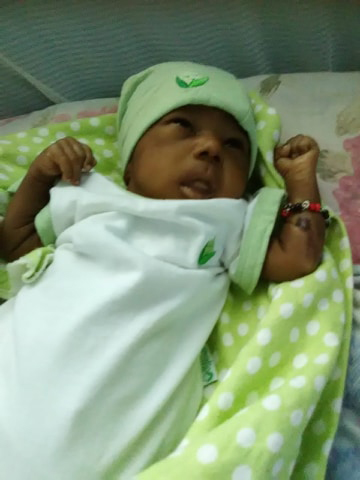Although confirming that newborn Quavo Forde suffered burns when a heat bulb in his incubator exploded, the Georgetown Public Hospital Corporation (GPHC) yesterday denied that these injuries contributed to his subsequent death.
“They [family members] were… informed that the superficial burns sustained by Quavo were not life threatening and, as evidenced by the post mortem report, did not cause his death,” the hospital said in a statement issued yesterday to address “inaccurate and misleading articles” on the child’s death. The hospital also said that because of his premature birth, the infant suffered from respiratory challenges until his death on February 8th.
When contacted on the findings, the child’s paternal grandmother, Sharon Harding, told Sunday Stabroek that she believed that the GPHC was seeking to cover up malpractice. She further said the statement issued was riddled with inconsistencies and she vowed that legal action will be taken against the hospital to ensure the infant’s family gets justice.
In its statement, which was issued just over a week after multiple media reports on the child’s death, the hospital explained that the infant’s mother, Odessa Forde, was admitted to GPHC’s Maternity Ward on December 19th, 2018 and had a premature delivery.
“At the time of birth, the infant was diagnosed with low birth weight, pulmonary sepsis and respiratory failure, all associated with premature birth,” the statement said, before adding that as is the norm with premature babies, the infant was transferred to the Neonatal Intensive Care Unit (NICU) for care and treatment. His mother was subsequently discharged on December 22nd, 2018, while he remained in the NICU until he was discharged on January 21st, 2019.
During his stay at the hospital, which was over one month, the statement said, Quavo remained intubated in the NICU and was “closely monitored” by the medical staff and treated with a variety of medication to improve his condition.
Further, the hospital explained that on December 24th, 2018, the bulb of a heat lamp that was located in the incubator to provide warmth for the infant “exploded causing an area on Quavo’s arm and another on his leg to be scorched.” Additionally, a nurse who was among several monitoring the NICU at the time also received superficial burns to her forearm as she removed the infant from danger. The hospital said that no other infant was affected by the incident.
Harding, however, reiterated yesterday that the baby’s mother was never told how he received the burns despite asking. This newspaper was previously told that Forde observed that the child had injuries to his left arm and other parts of his body during one of her frequent visits in January.
She added that Forde became aware of the origin of the burns on February 7th, one day before the child’s death. “While outside Intensive Care, she overheard that a lamp exploded,” Harding said.
‘Non-life-threatening’
The hospital said in its statement that after the lamp explosion, the attending physician was immediately summoned to examine the infant. It explained, “On examination, the physician found superficial, non-life-threatening burns to the infant’s left arm and leg. Quavo was subsequently referred to our Burn Care Unit for review and management.”
The statement, which added that following the “unfortunate” incident, the infant continued to receive care in the NICU until his secondary respiratory challenges were resolved, made no mention of Forde or any relative being informed of how the child was burned.
Quavo was discharged into the care of his mother on January 21st 2019 and she was given appointment dates to return to the hospital with the infant so that he could receive further treatment and so that his overall condition could be monitored, the hospital said.
According to the statement, on February 7th, some three weeks after discharge, he was readmitted to GPHC in an “extremely weakened state and with severe respiratory difficulties,” and despite the valiant efforts of the medical staff to stabilise him, he died the following day.
In accordance with GPHC protocol, a post-mortem examination was conducted on February 15th, 2019. The post-mortem report stated the cause of death as “inclusive” but ruled out “death due to burns,” the hospital statement said.
Addressing this, Harding questioned how the hospital has received the post-mortem results, while the family was told that they were not yet available. “We never got the post-mortem results… this is a total cover up,” the upset woman said.
The hospital said Quavo’s mother and Harding met with the hospital’s administration on February 12th, 2019, seeking information with regard to the circumstances that led to the infant sustaining burns. They were informed that the Administration had already mandated that a thorough investigation be carried out and the findings relayed to them upon conclusion. The family was subsequently invited to GPHC on February 18th, 2019 for a report, however, the family members were unavailable to attend. They were subsequently briefed on February 21st, 2019.
‘Protocols broken’
Harding again challenged the accuracy of the hospital’s account. She explained that they had spoken to the hospital’s Chief Executive Officer (CEO), retired Brigadier George Lewis, several days after the infant’s death and he indicated that he was unaware that a baby was burned and assured that an immediate investigation would be done and that he would make contact with relatives in two days. She said they were never contacted.
Harding denied that they expressed their unavailability to attend any meeting and informed that on February 21st, she along with Forde and a Red Thread representative met with two hospital officials, who admitted that all protocols were broken.
Further, she said they were informed that while the head of the Maternity Unit received a report of the burn injuries suffered by the child, this information was never passed on to the administration or the Complaints Department.
The hospital in its statement added that the family members were informed that the respiratory challenges and poor condition of the infant at the time of readmission were unrelated to his burns. “A formal apology was also offered to the family with regard to the burns sustained by the infant,” it said, before adding that following that February 21st meeting Forde appeared satisfied with the explanation offered, while Harding, who was not directly involved in the care of Quavo, remained relentless.
Harding strongly disputed this. She explained that earlier in the meeting Forde spoke a little but when asked towards the end whether she wanted to say anything she broke down and started to cry. Harding said that as the child’s grandmother, she had the right to be concerned and to also speak up when attempts are being made to cover up negligence. She said that following his discharge, the child was clearly in tremendous pain while pointing out that it was she who examined the child and found swelling at the site of one of the burns. Harding said that it was on her instance that the child was returned to the institution on February 7th.
“The incident was an unfortunate one that was random and unforeseen. We continue to monitor and conduct risk assessments on various types of equipment within this institution in an effort to continuously reduce the risks associated with their usage during patient care,” the hospital said before expressing condolences to the family of the child.





